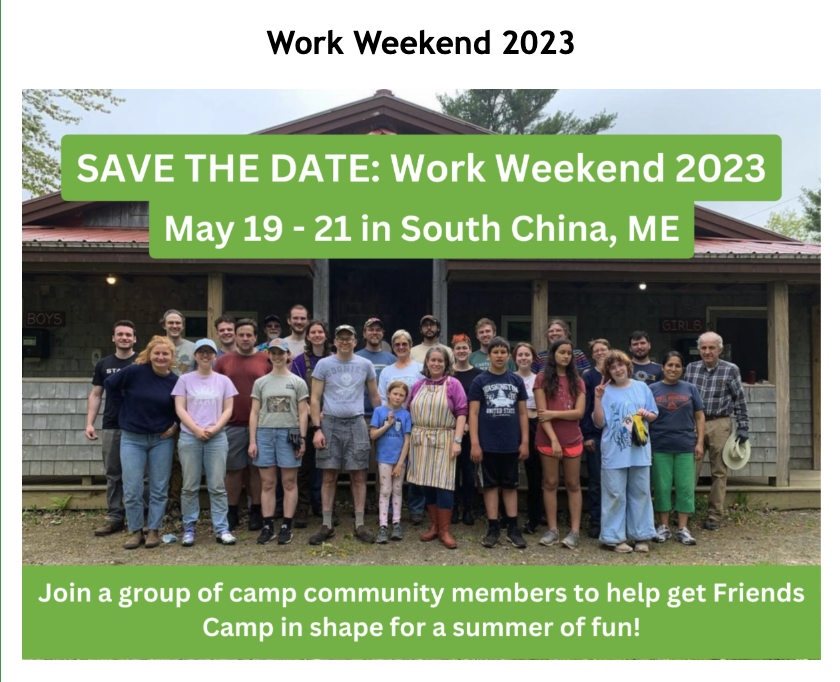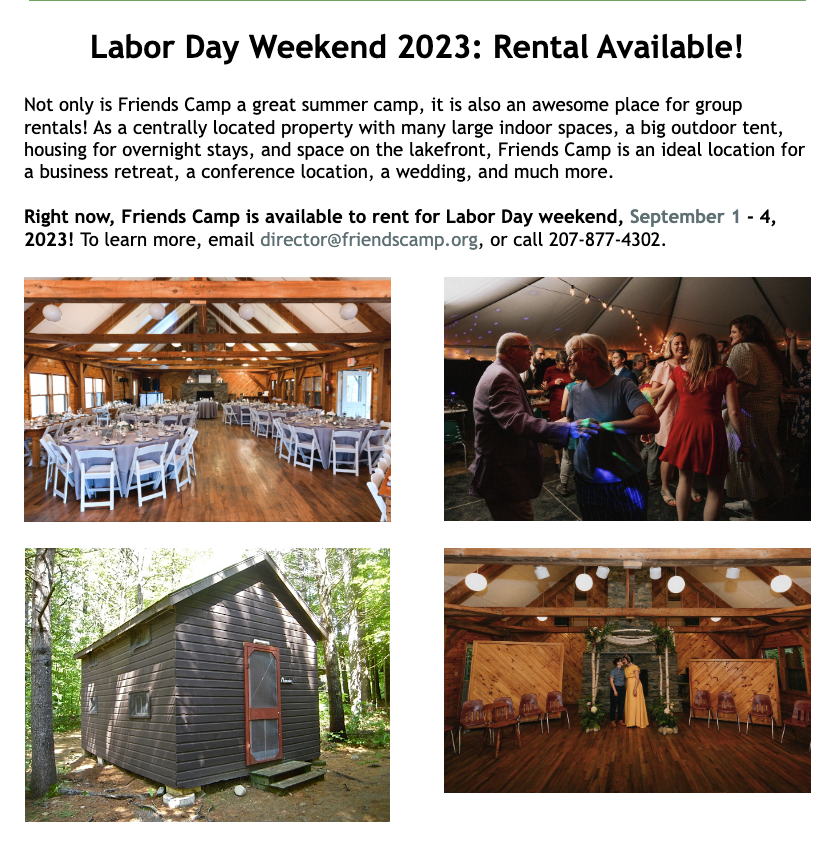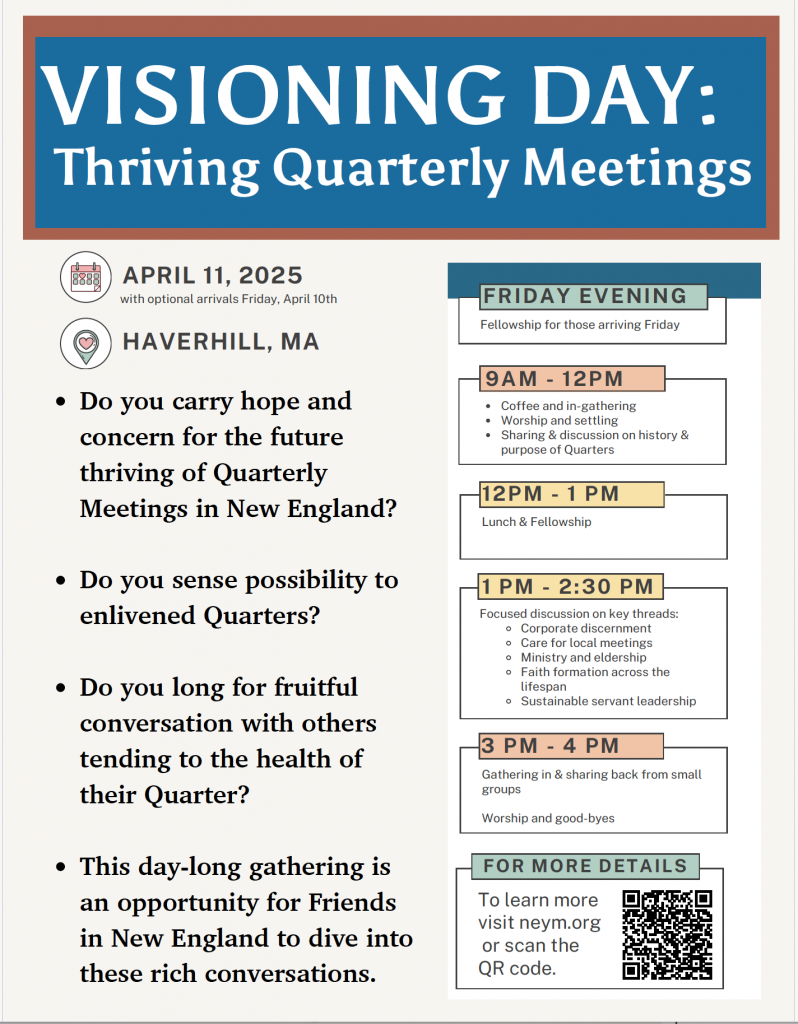
NEYM to Hold Visioning Day for Quarterly Meetings, April 11, 2026, Haverhill, MA



Here are the Epistles prepared at Annual Sessions of New England Yearly Meeting.
NEYM-2025-EpistlesActing on the request of New England Yearly Meeting Sessions 2025, a called meeting of New England Friends, convened by the Permanent Board, was held on October 18, 2025 to seek where we were led to act on the ongoing crisis in Palestine and Israel. The full minutes of the meeting can be found here. The deep and rich worship of those gathered at that meeting led us to find unity on a minute of actions and queries (see Minute 25-*1). While it cannot be expected that we all act on every one of the nine points in this minute, I ask that you bring this minute to your monthly meeting and consider which actions speak to your meeting and find ways to bring them alive. A minute is just words on paper until we bring them to life.
The gathered meeting found unity to endorse the Joint Quaker Organizations Statement on genocide in Gaza; a powerful statement that calls on its signatories and countries world-wide to take steps that will end the cycle of violence and violations of human rights in Israel and Palestine. By joining with many other Quaker bodies, we bring a united voice saying, “We hold in the Light all suffering peoples and leaders, praying they choose justice. In
Palestine and Israel, peace built on equality is the only path forward.” (see Minute 25-*2)
The final minute of the called meeting charged the Presiding Clerk, the Clerk of Permanent Board and the Israel-Palestine Resource Group to convene to explore, in consultation with those with experience in the region and who could provide context on the ground, the idea of sending witnesses to Gaza from the Yearly Meeting (see Minute 25-*3). After this consideration, this group will bring a recommendation forward to Permanent Board for their discernment. Details and advance documents for the Permanent Board meeting will be posted here when available.
Yours in peace, Phillip Veatch, presiding clerk; Susan Davies, clerk, Permanent Board
Minute 25-*1 from Called Meeting on Gaza held October 18, 2025
1. Engage with the AFSC Palestinian Program in their Fall 2025 efforts: Read, Mourn, Learn and Act; and consider taking up steps in the program in your monthly meeting.
https://afsc.org/news/6-ways-you-can-support-palestinians-gaza
2. Support Jewish neighbors
These two years have been deeply challenging in the Jewish Community. Jewish Voice for Peace (JVP) is an incredible organization, but for years it has been demonized by APAIC (the American Israel Public Affairs Committee )and others, so it isn’t always easy to turn to. There are increasing numbers of individuals who are horrified by what is being done supposedly in their name. It can be incredibly hard to speak up, but it is happening. How do we as individuals reach out to these folks and help them find their voices? What support do they need?
How do we support our Jewish neighbors who are targets of antisemitic actions? How can meetings and individuals reach out to Jewish communities and be clear of our support for their human rights and dignity regardless of political affinities?
3. Learn more about tax resistance and how to support those making this choice.
Next conference is November 7–9, 2025 at Worcester Friends Meetinghouse
4. Support those in or considering military service who struggle with conscience
5. Travel to the area and bear witness to the suffering. Contact us at https://neym.org/israel-palestine-resource-group to connect with those who have.
6. Provide financial support for the relief of suffering:
Palestinian Children’s Relief Fund, https://www.pcrf.net/
AFSC Gaza relief https://afsc.org/news/afscs-gaza-emergency-relief
Support Ramallah Friends School in the West Bank, which lost US AID funding:
7. Invite your Meeting to hold this discussion:
Peace and Reconciliation
Do you “live in the virtue of that life and power that takes away the occasion of all wars”?
Do you faithfully maintain Friends’ testimony against military preparations and all participation in war, as inconsistent with the teachings and spirit of Christ?
Do you strive to increase understanding and use of nonviolent methods of resolving conflicts?
Do you take your part in the ministry of reconciliation between individuals, groups, and nations?
When discouraged, do you remember that Jesus said, “Peace is my parting gift to you, my own peace, such the world cannot give. Set your troubled hearts at rest, and banish your fears”? John 14:27 NEB
(NEYM 1985 Faith and Practice, Query 12)
8. Discussion of Britain Yearly Meeting’s Statement on Genocide in Gaza
Adapted for United States Friends by Quakers for Peace:
9. And, finally, how do we hold ourselves accountable? Can the Israel Palestine Resource Group assist Meetings and Quarters in discerning what is ours to do?
Friends approved this minute.
Minute 25-*2 from Called Meeting on Gaza held October 18, 2025
The clerk asked if the body gathered was comfortable having the Presiding Clerk and the Yearly Meeting Secretary endorse the AFSC statement, mindful of the Policy on Public Statements (2015-57). “Quakers discern genocide is occurring in Gaza and urge courageous action.”
Friends approved this minute.
NEYM will hold a series of workshops on November 15, 2025, 9:00 to 3:00, that may be of interest to Friends. Schedule of the day and additional information below
First Parish Church
75 Great Rd
Bedford, MA 01730
United States
Here is the list of workshops to be held:
| Quaker Group Discernment: Clerking, Recording, and Active Participation Great for: New and experienced committee, board, or meeting clerks. New and experience committee, board, or meeting recording clerks. Any Friend who wants to develop & deepen their understanding & skills in discernment and Quaker process. |
| Best Practices in Nominating Great for: Friends serving on nominating committeesAnyone who yearns to draw out gifts and grow leadership in our Quaker communitiesFriends with a concern for healthy relationships and healthy functioning in our Quaker meetings. |
| Setting the Table for Newcomers Great for: Friends looking to share and hear ideas related to outreach Friends working to create a culture of welcome in their meeting. Friends concerned for connecting seekers and new Quakers with adult religious education opportunitiesFriends passionate about working towards a healthy future for our meetings. |
| Emerging Conversations About Ministry and Eldership in Our Meetings Great for: Friends serving on Ministry & Counsel (or similar role) in their meeting. Any Friends seeking to enrich the spiritual life at their meetingFriends bringing questions, resources, or experiences to share related to ministry and eldership in meetings. |
Do you serve your local Quaker meeting? Are you looking to connect with others serving in similar roles to discuss challenges and explore best practices? Join us for Meeting Care Day, an in-person event featuring multiple workshop options related to specific service areas. Before and after the morning and afternoon workshop sessions, we will gather for worship and fellowship, making for an energizing day.
All workshops are three hours, broken into two 90-minute sessions. Participants choose one workshop to participate in throughout the day. This year, participants can choose from one of four workshops:
Best Practices in Nominating
Nominating is an essential way we draw out gifts and grow leadership in our Quaker communities. Nominators sit at the intersection of the meeting’s needs and individual spiritual journeys. This work is deeply relationship-based and involves seeing the “big picture” of our ever-evolving meeting communities as well as the details involved in getting various tasks done. In many of our meetings, nominators quietly and lovingly engage in the one-on-one conversations that help our meetings thrive. This workshop, which will be of special interest to Friends serving on nominating committees, will provide a place to share best practices and unpack challenges in nominating. Facilitated by Lucy Meadows (Beacon Hill) and Jackie Stillwell (Monadnock).
Quaker Group Discernment: Clerking, Recording, and Active Participation
Join New England Friends’ new Presiding Clerk Phillip Veatch (Fresh Pond) and other Friends to develop and deepen skills in Quaker group discernment and decision-making processes used in our meetings, organizations, and committees including the particular functions of clerk and recording clerk. This workshop is designed to be of use to both those new to and experienced with Friends’ practices. Whether you are currently serving as clerk or recording clerk in a local meeting or on a committee or you are hoping to strengthen your participation in discernment outside a particular role, you are welcome.
Emerging Conversations About Ministry and Eldership in Our Meetings
What conversations regarding ministry and eldership are happening (or not happening) in our meetings? What guidance, practices, and resources are Friends able to offer one another in seeking to enrich the spiritual life within our meetings? What new challenges and opportunities are emerging, as we live into these unsettled times? Whether you serve on your meeting’s Ministry & Counsel committee or otherwise hold a concern for the spiritual health of your meeting, we invite you to join an exploratory conversation and resource-sharing opportunity. Facilitated by Janet Hough (Cobscook), clerk, NEYM Ministry & Counsel.
Setting the Table for Newcomers
In each of our local communities, there are spiritually hungry seekers yearning to connect. How can we extend a living invitation and set the table to feed newcomers and long-time Friends alike? Join us for a conversation about outreach, welcome, religious education, building belonging, renewal, and change in our Friends communities. Conversation starters will include Emily Mason who followed a leading to begin the Orchard Hill Worship Group in New Hampshire and Phil Fitz who was led to develop the Elements of Quakerism course to move Friends past Quakerism 101 in his home meeting in Northampton, MA and beyond, and Regina McCarthy who has been a part of Wellesley Meeting’s varied efforts to welcome newcomers and families. Facilitated by Program Director Nia Thomas (Northampton).
Ready to register? Go here.
Questions or suggestions? Contact Program Director Nia Thomas.
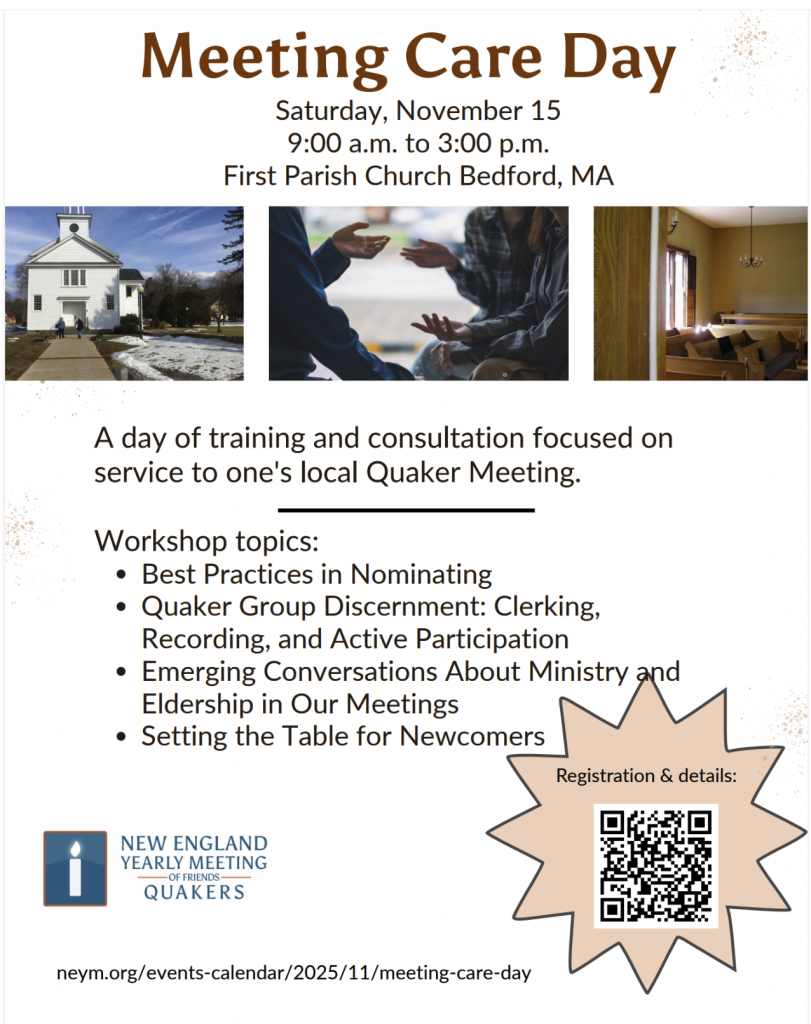
We’ve received the following letter from New England Yearly Meeting regarding Youth Retreats.
Back to school greetings to you! As Yearly Meeting youth program staff we write to you today in hopes you can help ensure that as many Friends as possible know about our Quaker youth retreats. Could you share this message with Friends in your meeting?
New England Quakers have been blessed with spiritually robust, well attended, and much-loved year-round youth programs. Among our most cherished ministries, our weekend youth retreats offer a meaningful opportunity for Quaker youth to connect with peers, experience loving community, and grow in their faith. Our retreats are fun, centering, playful, grounded, youth-centered spaces for Quaker and Quaker-curious youth.
Are there families or individuals in your meeting who might be interested but don’t know about retreats (or don’t know where to find the details)? If so, the best way to stay in the loop about youth retreats is to subscribe to receive updates for the age group(s) of interest at https://neym.org/newsletter-signup. You can also read basic information about retreats on our website here.
Attached is an electronic version of postcards with the retreat calendar and information about our programs for elementary, middle, and high school youth (Junior Yearly Meeting, Junior High Yearly Meeting, and Young Friends). If you would like physical copies mailed to your meetinghouse for distribution email Kara Price (kara@neym.org). These postcards will be sent directly to families who already participate in our retreats.
Thank you for reading, spreading the word, and helping to make the upcoming retreat year a wonderful one.
Warmly,
Xinef Afriam, Teen & Outreach Ministries Coordinator (Xinef@neym.org)
Kara Price, Children & Family Ministries Coordinator (Kara@neym.org)
Nia Thomas, Program Director (Nia@neym.org)
Register Now! Registration closes July 14.

Find all the information about Sessions and how to register at https://neym.org/sessions

Find all the information about Sessions and how to register at https://neym.org/sessions
[Updated 25.6.10] NOTE from Fritz Weiss, Falmouth Quarter co-clerk: We will be hosting a “local cluster” at Portland Friends Meeting for the Meeting for Healing event described below. We will be zooming into the event together starting at 9:00AM. Please let Heather Denkmire know if you plan to attend for all or part of this event by replying to this email.
This event does coincide with Portland Pride – the parade will be starting around 1:00, so Friends may choose to come to the local cluster for the morning. For Falmouth Quarter. Love Fritz
Meeting for Listening: The Spiritual Life in Our Local Meetings, A full day, hybrid event, Saturday, June 21, 2025
Friends are most in the Spirit when they stand at the crossing point of the inward and outward life. And that is the intersection at which we find community. a place where the connections felt in the heart make themselves known in bonds between people, and where the tuggings and pullings of those bonds keep opening our hearts. (Parker Palmer, A Place Called Community, Pendle Hill Pamphlet #212, 1977)
Join us for a gathering of Friends in New England caring for the nurture of spiritual life and ministry in our local faith communities. Together, we will:
· Dream together
· Identify the resources meetings have to offer each other
· Explore themes in State of Society reports and trends from statistical reports
· Discover what’s possible now
Our Yearly Meeting’s primary purpose is to support monthly meetings, to be a vehicle to share resources and experiences among and between us in order to better understand our life in the Spirit and to be able to listen more closely to the Teacher. With that in mind, we began holding an annual “Meeting for Listening.”
Last year, there was a strong sense of deep sharing, of drawing together. We left the day having heard about our unique challenges. We also shared the many places we face common obstacles and celebrate common joys.
Our next “Meeting for Listening” is scheduled for June 21, 2025. It will be a full-day, hybrid gathering where Friends can gather in different ways: on site at Hartford (CT) Meeting, in self-organized local clusters connected via Zoom, or individually via Zoom.
We gather to share with each other—to reflect on where Spirit is alive in our local worshiping communities. These insights and reflections will both inform programmatic planning in the year ahead and our annual Funding Priorities.
This year, we will focus on how meetings across our region are leaning into community. Participants will have the opportunity to explore three themes related to this leaning in:
· Renewal, including welcoming and integrating new attenders and new perspectives, religious education, and visibility in our local communities
· Loss, including smaller numbers, leadership changes, aging membership, and the resulting need to rethink care for buildings, resources, and meeting functions
· “These times,” including the spiritual condition of Friends in relation to the world, witness and engagement, discerning individual and corporate leadings, and the role of eldership.
Registration is now open. Whether you plan to participate via Zoom or gather with others, you can register for this free-of-charge event at neym.org/Meeting-for-Listening. If you plan to attend on site in Hartford, please register by June 12th if you can. This will help us comfortably accommodate everyone.
Are you led to host a local cluster in your area? If rather than traveling to Hartford, you are interested in inviting area Friends (for example, your Quarter) to gather at your meeting’s location in a regional cluster to participate in the gathering together, connected via a shared device or system, we would love to support you in doing so, as much as we are able. Contact us (mc-clerk@neym.org and Nia@neym.org) to begin a conversation.
Looking forward in faith, Carl Williams, Ministry and Counsel Clerk, Nia Thomas, Program Director
Regarding the matters discussed (materials HERE and minutes HERE) at the called meeting of Falmouth Quarter on May 6, 2025 concerning the scheduling of Annual Sessions and also concerning Israel-Palestine matters, two letters have been received from Northampton Meeting and Mt. Toby Meeting. They are below:
In addition, those interested in reading what New England Yearly Meeting has discussed and minuted in recent years regarding Israel-Palestine please see the materials collected HERE on the NEYM website.
You are invited to join with Quakers from around Maine for the All Maine Gathering hosted by Vassalboro Quarterly Meeting on Saturday, May 3. It will be held at the South China Community Church, 46 Village Lane, South China, Maine 94358
Program: A Quaker Spin on the Spiral of Active Hope led by Mark Rains
The program for All-Maine Gathering will include opportunities for personal reflection and sharing, leading into small group exploration of Macy and Johnstone’s book and videos for “ACTIVE HOPE: How to face the mess we’re in with unexpected resilience and creative power”, with resources which Friends can take back to their meetings and communities. Brief queries will focus on gratitude, inspiration, concerns, possible action steps, obstacles, and supports. Small groups for lunchtime conversations may emerge to explore four spiraling steps from “experiencing gratitude” and “honoring specific concerns” (climate, exploitation, immigration, democracy, etc.), through ways that Quaker faith and practice (e.g. SPICES) can inform “seeing concerns through new eyes” and “going forth”, as led and supported.
Provisional schedule
8:30 Mugs & Muffins
9:00 Meeting for Worship followed by introductions
10:30 Program
12:00 Lunch – Soup will be provided. Contributions of bread, veggies, fruit & desserts are welcome.
1:30 Worship sharing / continued discussion
2:45 Closing & Clean-up
~ The Vassalboro QM Leadership Team: Mark Rains, Cynthia Harkleroad, Holly Weidner, Janet Hough
Rachel Carey-Harper, a Quaker in New England Yearly Meeting, recently made a gift to Durham Friends. (At the same time she made similar gifts to other Meetings in NEYM.) She asked us to re-donate this money to causes of importance to us. Here is what we have done.
From the February 2025 Meeting Minutes: The Meeting received a $2,000 gift from Rachel Carey-Harper. She expressed a desire that the money support people who are affected by the ways in which our government is no longer funding organizations, e.g., immigrants and refugees, LGBTQ+, Women’s shelters, etc. The money may be given to more than one organization. The suggestion was made that a portion of the funds go to domestic violence survivors. Several people spoke in support of giving to Maine Immigrant and Refugee Services (MEIRS) today, the need being immediate. Clerk proposed giving $1,000 to MEIRS today, and return next month to discuss allocation of the remainder. Meeting approved this proposal.
From the March 2025 Meeting Minutes: “On the use of Rachel Carey-Harper’s Donation — Linda Muller. After conducting some research, Linda Muller and Sarah Sprogell recommend the Meeting donate the remaining $1,000 (out of the original $2,000 gift) to Safe Voices, a domestic violence direct service organization working in Androscoggin, Oxford and Franklin Counties. This is a geographic area of greater risk, many towns without standing police departments. Over 2,700 women were served last year. Meeting heartily approved this contribution.”
Rachel Carey-Harper has asked us to look at and give feedback to Healing Reflections, a new website launched with support, collaboration, and guidance from Barnstable Friends Preparative Meeting and approval of Mattapoisett Monthly Meeting. The website focuses on grounding ourselves in what connects us, healing that which separates us from each other, and ways we can move forward in love. They would like to know if you think there is anything being presented that is contrary to basic Friends faith and principles. We are encouraged to contribute to the “From the Orchestra” section which includes messages or reflections sharing our sense of Spirit.
You can learn more about the family business, Eden Hand Arts, which Rachel Carey-Harper now owns, HERE.
Friends Camp has let us know that there are still spaces available for kids of all ages at Friends Camp this summer — but those spaces are going fast. Also there are camperships (scholarships for camping) available for all ages.
Friends Ca,p i the Quaker Summer Camp of our Yerarly Meeting, and located in China, Maine. It is a wonderful way for kids to build community with other young Friends, develop their Quaker identity and have a wonderful adventure.
To learn more, visit www.friendscamp.org.
 Local Youth Ministries Supporting Each Other (LYMSE) Next session: September 23, 7:00 to 8:00 pm CLICK HERE TO REGISTER FOR THE NEXT LYMSE SESSION |
 Fall Retreats in an Election Year: Fall Retreats in an Election Year:Rebuking the Wind and Waves |
| Junior High Yearly Meeting (JHYM) Fall Retreat for 6-8th graders October 4-6 Portland Friends Meeting Portland, ME Junior Yearly Meeting (JYM) Fall Retreat for 2nd-6th graders November 8-10 Woolman Hill Retreat Center Deerfield, MA to register for events, go to the Youth Ministries Retreats page on the NEYM Website |
 Rebuking the Wind and Waves Rebuking the Wind and WavesWhen I realized that I had scheduled a JYM retreat on the weekend after the election, I gulped. Would we be able to tune out the world just two days after learning the results? Would the staff be ready to answer questions the kids might be asking – questions that adults might be still asking themselves? Did I need to plan multiple contingency schedules to respond to different scenarios, results, and reactions? And what about JHYM – should I be planning a retreat that addressed the rhetoric and controversies that would be undoubtedly swirling around us by October? I conceded that I didn’t have a crystal ball, and realized that I had to plan something that would ‘work’ regardless of the outcome, making space for any outcome and any emotions we may be feeling. Something steadfast. Something hopeful. And it occurred to me that this ‘something,’ this theme, this message, should be the same – unchanging – whether it was a month before the election or two days after. Because our values won’t have changed. God* won’t have changed. Our faith – whether emboldened or shaken – is always relevant. As I meditated on the concept of this no-matter-what faith, I remembered the story of Jesus calming the storm. He was on a boat with his disciples when the storm started. In response to the disciples’ fear, Jesus uttered the famous line, “O ye of little faith.” Jesus had not been afraid. In fact, his mood and behavior hadn’t changed since the calm sea had rocked him to sleep hours earlier! It was only because they woke him up in a panic that he felt the need to do anything at all. And they say he “rebuked the wind and waves,” calming the sea, along the with the fears of the crew. Wind and waves always exist in our lives. Sometimes they are political and societal. They can also be emotional, spiritual, relational, medical, or financial. But we can have hope no matter what. We can have faith no matter what. And this election season is a great time for us all to be reminded of that concept, which we can carry into the rest of our lives. Wherever your child is on the politically savvy spectrum, whatever else they might be struggling with in their life – and even if they are blissfully ignorant of any hardship in the world right now – this theme can speak to them and provide comfort in storms of the present or future. We will explore the aforementioned scripture passage in that open-ended, metaphorical, individualized way that Quakers do. We will play team-building games that are ocean and/or ship themed. We will talk about how to be grounded in our lives. At the retreat in Portland, we will experience waves on a ferry ride. At Woolman Hill we will visit the preserved home of war tax resisters who rebuked the winds of injustice by living simply. Please join us by registering today! In Peace, Kara Price Children and Family Ministries Coordinator New England Yearly Meeting *Sometimes I use the word God to refer to that divine light that exists within and outside of all of us. Sometimes I use other words. The volunteer staff use a variety of words too. Retreats are an opportunity for all of us to ‘listen in tongues’ and learn from and about each other’s spiritual journeys in a mutual respectful way. Similarly, scripture is one of many ways that we can access the divine and explore concepts of faith at this and other retreats.  THANKS FOR A WONDERFUL SESSIONS! THANKS FOR A WONDERFUL SESSIONS!CHILD CARE STAFF Rainer Humphries (Coordinator) Carol Baker (Assistant Coordinator) Brooke Burkett Jennifer Hogue Jerry Carson Mary Lee Morrison Pamela Drouin Paula Rosvall Peter Colby JYM STAFF Kenzie Burpee (Coordinator) Leah Kelley (4-6th Grade Leader) Joli Reynolds (K-3rd Grade Leader) Annie Bingham Craig Jensen Emily Smith Isaac Bingham Luke Coletta Lizzie Szanton Martha Schwope Mary Chenille Rebecca Edwards Sophie Jones Tyler Green JHYM STAFF Emily Edwards (Coordinator) Merritt Bussiere-Nichols (Asst. Coord.) Buddy Baker-Smith (Asst. Coord.) Abigail Adams Amy Greene Ari Schifman Brennon Schifman Chloe Grubbs-Saleem Chris Fitze Dave Baxter |
Durham Friends folks are invited to Vassalboro Quarterly Meeting’s Fall gathering, Friday and Saturday, Seotember 6&7. The Friday evening session will be via Zoom. The Saturday session will only be in-person at Friends Camp (no Zoom). The full announcement and schedule is below. (Vassalboro is a neighboring Quarterly Meeting; Durham is part of Falmouth Quarterly Meeting.) Note an RSVP is requested if you plan to attend either session.
Friday evening will focus on the spiritual state of member meetings of Vassalboro Quarter. The Saturday program will focus on Friends relations with Native Americans.
Fall Gathering 2024, Sept 6th, 6:30 pm-8pm on Zoom and Sept 7th, 8:30 am- 3pm at Friends Camp, China Maine
“Few are guilty………All are responsible” Rabbi Abram Joshua Heschel
“A sower went out to sow his seed. And as he sowed, some fell by the wayside; and it was trampled down, and the birds of the air devoured it. 6 Some fell on rock; and as soon as it sprang up, it withered away because it lacked moisture. 7 And some fell among thorns, and the thorns sprang up with it and choked it. 8 But others fell on good soil, sprang up, and yielded [a]a crop a hundredfold.” When He had said these things He cried, “He who has ears to hear, let him hear!” Luke 8: 5-8
Greetings , Friends,
Many “seeds” were sown during Yearly Meeting sessions this August. We were asked to have ears to hear so that we may be the “good soil” and yield.
We were also told of some of our Quaker history and involvement in the Indian Boarding Schools in the 1800-1900’s.
Through the deep and personally-grounded messages, we, as a body, discerned the way forward on the heavy issues facing us.
So, for this Fall Gathering, we wanted to hear the voices from Friends in Maine (all of you!) on what is lifting you up? How are you led, and how do you prepare the soil? How do you nourish the seeds of good within and around you?
On Friday evening, we will be hearing highlights from our monthly meeting’s spiritual life, “state of society,” and reflecting on how those “seeds,” from other monthly meetings, find soil in us to start to grow towards the Light.
On Saturday morning, we will be hearing from two Friends. First, Shirley Hager will share how she came to her most recent leading to foster creation of a program of support for first time Wabanaki university students. Then we will hear from Janet Hough and how following her current deep dive into the Friends Indigenous Boarding school’s is changing her. We will have worship following each offering and a chance to reflect and share.
On Saturday afternoon, there will be a choice to have discussion and open sharing about either:
1) diving deeper into what is rising up for us when we hear of historic & present indigenous oppression
or
2) what is rising up in our response to other injustices
Please save the date and spread the word of Fall Gathering , on the weekend after Labor Day, Fri. Sept 6 and Sat.Sept.7th.
Friday, Sept 6th on Zoom from 6:30-8 pm; a link will be sent
Saturday, Sept 7th in-person at Friends Camp (no Zoom) under the tent or in the Aviary, if the weather requires
See next page for more information about hospitality & Saturday’s schedule
Saturday schedule
8:30 am : Fellowship with refreshments and finger foods
9-10 am : Intro and worship sharing on the Parable of the seed and the soil.
10:15-11 am : Shirley Hager: “The Evolution of a Leading: Way Keeps Opening,” followed by worship sharing
11:00 am: Janet Hough will share about her journey exploring NEYM’s involvement in Quaker Indigenous Boarding Schools, followed by worship sharing;
12:00 pm Lunch (soups from Vassalboro MM), veggies, fruit, salads, breads from other attenders
1: 15pm-2:30pm Break into group of choice for sharing
2:30- 3pm Sharing reflections from the day
For those who would like to stay with Vassalboro Friends on Friday or Saturday evenings, hospitality is offered at the contact below.
Please bring a veggie, fruit, salad or bread to offer for lunch. A choice of soups is provided by Vassalboro MM Friends.
A link for Friday eve will be sent the week prior to all on this email list. If you didn’t receive this email directly from Janet, please ask to be added to the list if you wish to receive further correspondence and the link directly.
FMI or hospitality questions…………Holly Weidner weidnerholly@gmail.com or 649-1305
RSVP is appreciated for Friday and Saturday attendance but not required.
Feel free to invite others who you feel may be interested in joining us for this day of sharing and listening.
The theme for this year’s Sessions is Let us faithfully tend the seed. Rich with imagery, our theme both calls us to act in the world in ways that give voice to the Inner Light and also to let go of our individual truth and listen for the voice of God in others.
Dates: Friday, August 2 through Wednesday, August 7
Location: Vermont State University (formerly Castleton University) in Castleton, VT
Sunday Plenary: Lloyd Lee Wilson, Friendship Friends Meeting, North Carolina (Conservative)
Bible Half Hours: Genna Ulrich, Portland Friends Meeting (ME)
Monday Night Plenary: Toussaint the Liberator, Stone of Hope Drumming (MA)
More information about sessions is available here.
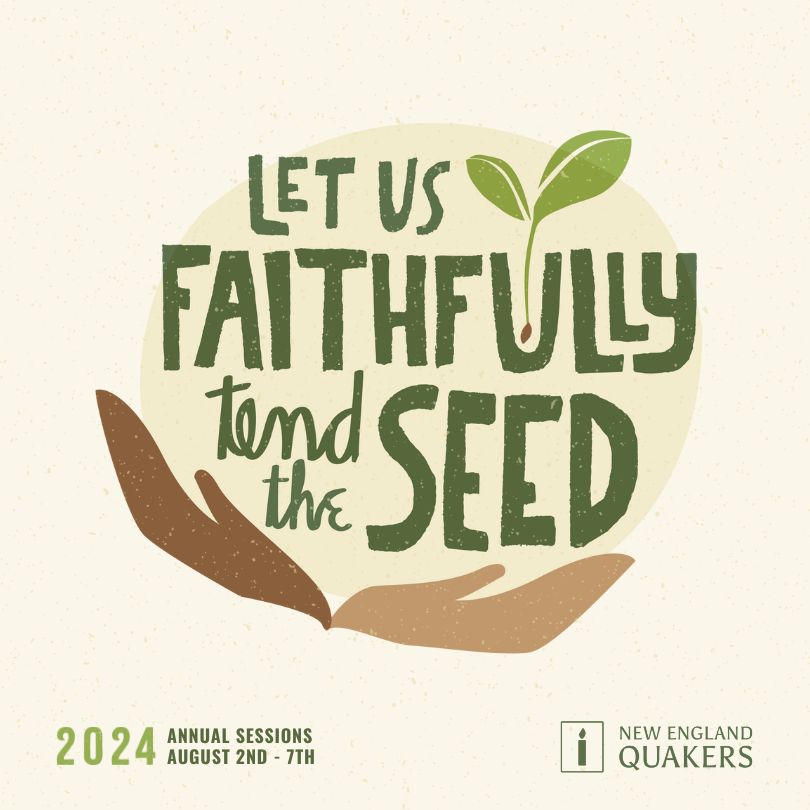
| From New England Yearly Meeting: Register for the Midwinter Retreat by January 2nd Hello Young Friends!You are invited to our upcoming Midwinter Young Friends Retreat! We will gather at Woolman Hill Retreat Center in Deerfield, MA from Saturday, January 13th at 10 a.m. to Monday, January 15th at 12 p.m. The theme is “We are Whole Beings!”. Over the long weekend, we will explore inward, with choices to engage in conversations and activities around different aspects of our whole selves: gender, sexuality, relationships, mental health, spirituality, and Quakerism. We will also play games, get to know each other, and enjoy the beautiful nature that Woolman Hill has to offer. Anyone who is of high school age and curious about Quakerism is welcome to come!While we will not have a formal sex education as part of the structured retreat program, there will be educational materials available to Young Friends (such as books and pamphlets on sexuality, sexual health, and gender), as well as opportunities to ask anonymous questions to a health professional. This topic is part of the retreat because we hear from Young Friends that our sexuality, gender, and relationships–just like our spirituality–are aspects of ourselves that warrant loving reflecting and learning as we grow through adolescence. At this retreat, we seek to offer an affirming and age-appropriate space for that reflection and learning. We know different aspects of this broad theme will speak to different individuals and nobody will be required to engage in a program that they are uncomfortable with. The goal is to have electives so that each Young Friend can explore topics that feel relevant for them. If you have any questions or concerns about any aspect of the retreat, please be in touch with Young Friends Interim Coordinator Drew Chasse (drew@neym.org). Join us for a long weekend centered around embracing our wholeness with integrity, understanding, openness to Spirit, and love. Other reasons to be excited about Young Friends Midwinter:It’s 8 hours longer than our other weekend retreats: more time to get to know one another and have fun!We sleep in beds and there are showersCozy fireplace in a 150-year-old farmhousePlease note that this retreat will begin on Saturday morning on January 13th (rather than Friday night on the 12th). Young Friends may arrive between 10:30 and 11:30 a.m. on Saturday, and leave between 11:30 a.m. and 12:00 p.m. on Monday. This retreat does fill up, so please register early to make sure you get a spot! The deadline to register is Monday, January 2nd. I really hope we’ll see you later this winter! Love, Drew Drew Chasse, she/they Interim Young Friends Coordinator 978-382-1850 drew@neym.org |
November 3, 2023
Statement on Conflict in Israel-Palestine
These troubled weeks have brought yet again a devastating eruption of the long suffering caused by the conflict in Israel-Palestine. With anxiety and heartbreak, we witness the horrors unfolding in Gaza, Israel, the West Bank, and beyond. The global community of Quakers, of which we are a part, includes Friends with deep roots and relationships in the land between the Mediterranean and the Jordan. As violence has expanded and intensified in recent days, alongside continuing strife raging across the globe and violence in our own region, we write on behalf of the Quaker faith communities in the six New England states to offer our prayers and raise our voices and hands for the healing of the world.
The Religious Society of Friends (Quakers) holds that every person has the capacity to receive and respond to the love and guidance of God. All human beings are created and unconditionally beloved by God. We are dependent on one another, and it is through our relationships—as persons and as societies—that our lives make real our love for God and neighbor. We join our voices with all who strive to meet the sacred obligations to acknowledge and honor the belovedness and dignity of every person, every life.
We affirm again the declaration of the first Quakers in 1660:
“We utterly deny all outward wars and strife and fightings with outward weapons, for any end, or under any pretense whatsoever; and this is our testimony to the whole world. The spirit of Christ by which we are guided, is not changeable, so as once to command us from a thing as evil and again to move unto it; and we do certainly know, and so testify to the world, that the spirit of Christ, which leads us into all Truth, will never move us to fight and war against any man with outward weapons, neither for the kingdom of Christ, nor for the kingdoms of this world.”
We are called to reflect and pray more deeply, resisting reactivity, aggression, self-justification, and othering of those we experience as enemies. We must recognize and resist the escalating pressures throughout our human family that attempt to justify atrocities against fellow human beings. We remember that we are each capable of evil, even in the name of good. And we are called to daily examine and reject the seeds of war in our own hearts and living, through God’s help.
Promoting adherence to universal humanitarian values, and to the essential use of nonviolent methods to resolve differences, is not simply an option but a necessity for the survival of the human family. With humility and boldness, we take up and renew a commitment to turn from indulging our own hostile impulses, from the fostering of division within our local communities, and from the rush to violence and escalating cycles of retributive action in conflicts worldwide, and turn toward the courageous work of peacebuilding.
We join with people throughout the world calling for an immediate ceasefire and for the provision of desperately needed humanitarian aid to the people of Gaza. We affirm and support the ongoing work of the Friends Committee on National Legislation and the American Friends Service Committee in their advocacy and service in support of a just peace for all. We unite with this recent statement on Gaza issued by wider Quaker bodies and Friends organizations of which we are a member.
Let us each continue to seek paths to participate in the work of peace, in whatever ways and with whatever tools are available to us. We are called to act in faith, with persistence, patience, and courage, as partners with Divine Love in the deep healing of the world.
New England Yearly Meeting of the Religious Society of Friends (Quakers)
Rebecca Leuchak, Presiding Clerk
Noah Merrill, Yearly Meeting Secretary
From the Faith and Practice Revision Committee to the Clerks of NEYM’s monthly meetings:
This August the F&P Revision Committee brought a draft Introduction to Sessions for the Yearly Meeting to consider. Attached is the Draft Introduction and a Cover Letter asking meetings to consider the text and to send responses to the Revision Committee by March 1, 2024.
Any questions should be addressed to fandp@neym.org.
New England Yearly Meeting’s Annual Sessions for 2023 have come to a close. Available here are recordings of some programs from those sessions, including
— a plenary with Joseph Bruchac (an Abenaki storyteller) & Jesse Bruchac (an Abenaki language teacher), and
— the Bible half-hours with Emma Condori Mamani, a Bolivian Friend who spoke recently at Durham Friends Meeting.
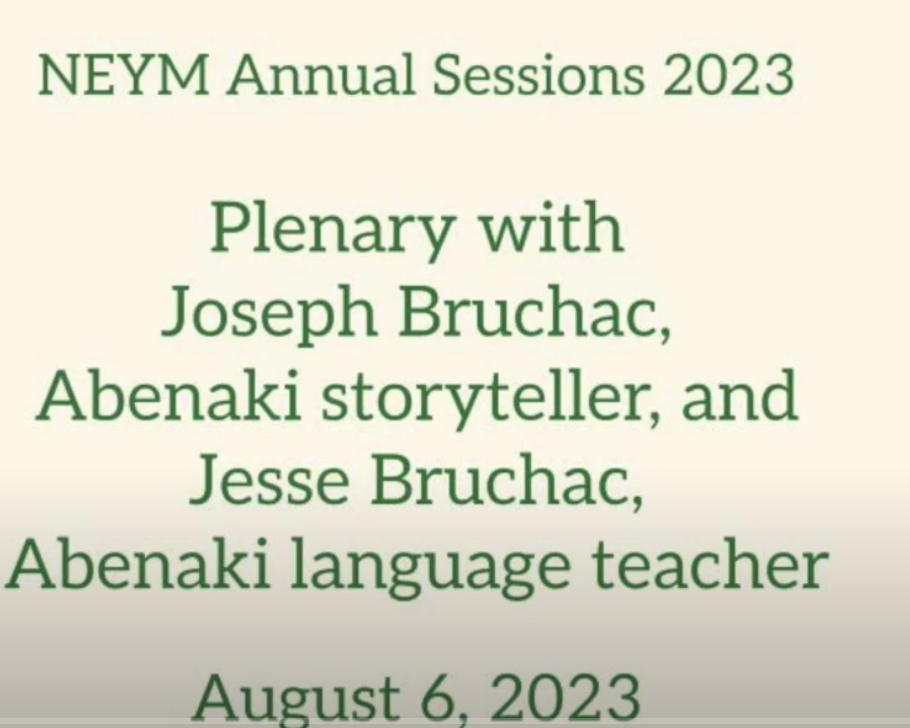
New England Yearly Meeting’s Annual Sessions will be held this year from August 5 to 9, at Castleton State University in Vermont. This link will take you to further information and registration information.
These will be the 363d annual sessions of NEYM.
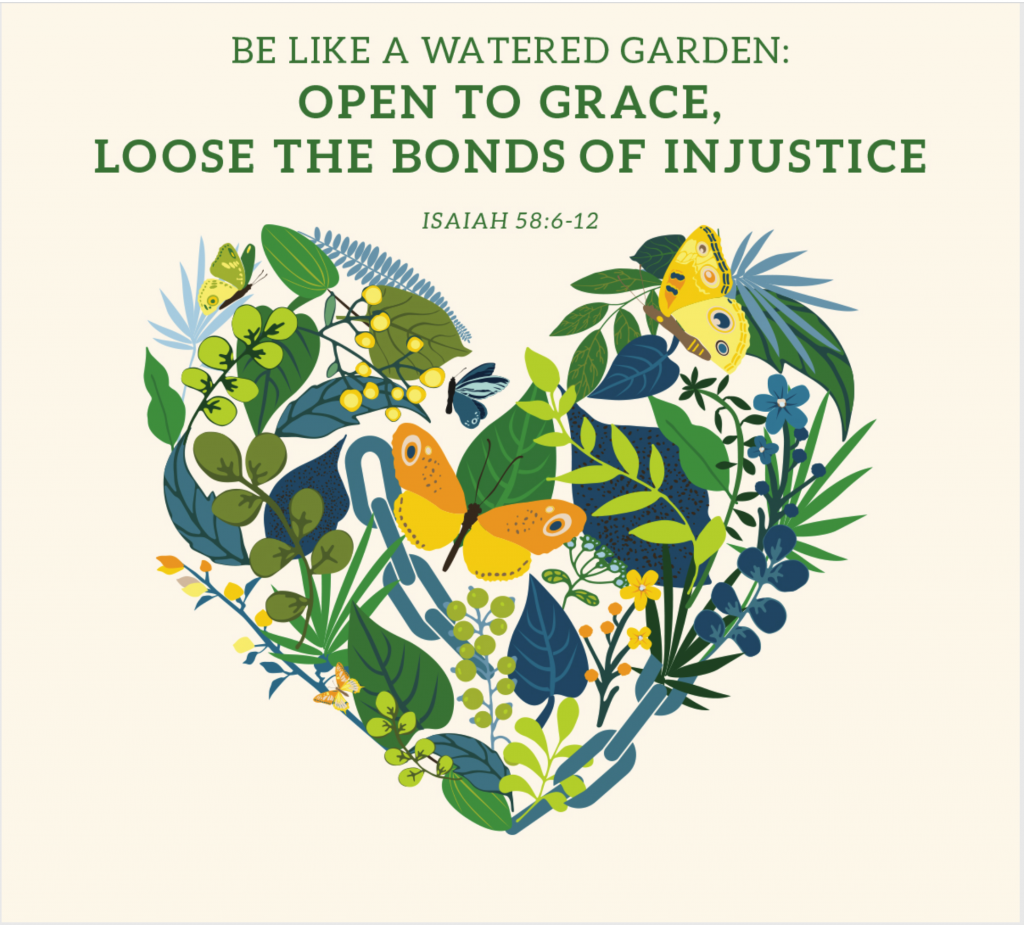
[Updated August 1, 2023] Our member Dorothy Curtis has safely and happily returned from her travel to the USFWI and FUM Triennials in Kenya. (That’s every-third-year or so gatherings of U.S. Friends Women International and Friends United Meeting, for those not familiar. She will make a report on the experience at the September 17 Monthly Meeting for Business.
Meanwhile, here is a link to the combined Epistle from the Triennial.
And here is a report on these gatherings from Marian Baker, also from New England Yearly Meeting that includes some photos of Dorothy in Kenya among Friends:
Rept.-from-Kenya-USFWI-Triennial-2023The letter below from New England Yearly Meeting tells the story of the origin of the Legacy Gift Funds (the Future Fund and the Witness and Ministry Fund). They are now beginning a discernment process about the future use of remaining money, and are seeking input.
Letter-to-meetings-v-2On June 24th, “Meeting for Listening: The Spiritual Life in Our Local Meetings” is an opportunity for Friends across New England to reflect together on the spiritual life in our local meetings: to dream together; to identify the resources meetings have to offer each other; to unpack themes in State of Society reports, as well as trends from statistical reports; and to explore what’s possible now.
From 9am to 3pm, Friends can gather together in-person or Zoom in. You can register for the event here online. There will be a local cluster participating at Midcoast Meeting House in Damariscotta, ME. This is a smaller group of Friends connected to the other participants via a shared Zoom connection. If you are interested in participating from this site, please contact clerkmfm@gmail.com. If you plan to attend on-site in Concord, please register by June 20th, if possible.

Saturday, June 24, 2023, 9am to 3pm, Concord Friends Meeting (NH) and also via Zoom from Midcoast Meeting.
Join us for a day of worship, prayer, celebration, and discovery. Come together to explore the gifts and paths that our meeting’s challenges have offered us the past year. Let’s see where Spirit is alive in our communities.
We will reflect on the life in our local meetings to see where we can inform the Yearly Meeting on how to best support local meetings through programmatic priorities.
Together we will:
A guiding quote for the day will be the following:
“Friends are most in the Spirit when they stand at the crossing point of the inward and outward life. And that is the intersection at which we find community. a place where the connections felt in the heart make themselves known in bonds between people, and where the tugging and pullings of those bonds keep opening our hearts.” (Parker Palmer, A Place Called Community, Pendle Hill Pamphlet #212, 1977)
This meeting will be planned and hosted by the clerk of Ministry and Counsel, the clerk of the Meeting Accompaniment Group, and by the Program Director.
Participants can participate in this event on-site at Concord (NH) Meeting, via Zoom, or gathered with a local cluster connected via Zoom.
There will be a local cluster participating from Midcoast Meeting in Damariscotta, ME. If you are interested in participating from this site, please contact clerkmfm@gmail.com.
If you plan to attend on-site in Concord, please register by June 20th, if possible. This will help us comfortably accommodate everyone.
We are looking for volunteers who are willing to serve as event greeters and tech assistants. If you are interested in volunteering, email Nia (nia@neym.org).
Questions? Suggestions? To contact the gathering hosts, email Carl Williams (mc-clerk@neym.org)
All in-person participants over the age of 4 years must be fully vaccinated against Covid-19 (with boosters strongly encouraged for all eligible). Friends are encouraged to test at home before the event. Stay home if you are experiencing Covid symptoms. Participants who have recently tested positive must follow the CDC guidelines for isolation and exposure. Masks are optional and the choice to mask will always be respected. There will be indoor and outdoor dining spaces.
At the All Maine Gathering on 5-8-23, we invited Friends to share concerns and queries that they hoped to have brought back to Monthly Meetings. If a Monthly Meeting engages with any of these concerns and would like to share reflections, please send your reflections to either Fritz Weiss (rossvall.weiss@gmail.com) or Wendy Schlotterbeck (wendy.schlotterbeck@gmail.com) for FalmouthQuarter, or Carole Beal (carolebeal@gmail.com) and Janet Hough (janet.hough5@gmail.com) for Vassalboro Quarter and we will forward the reflections to all the meetings in Maine.
The following concerns are shared.
Love Fritz Weiss, 23.5.12
A small group of Friends has been appointed to shepherd and support Friends responding to Yearly Meeting minute 2017-46 and the request made in Yearly Meeting minute 2019-36 for monthly and quarterly meetings to consider whether they have lived into minute 2017-46.
To be connected with the Israel-Palestine Resource Group, please send an email.
As meetings share back how they are engaging with this work, we will share what we have heard here so that it can serve as a source of inspiration and fruitful connection.
Useful resources are available at this link including several videos
New England Yearly Meeting’s Noticing Patterns Working Group is offering four “Learning Conversations” in April. They encourage attendance at one or more of these sessions as schedules allow.
These sessions will happen on April 5, 18, 25 & 26 from 7 to 8 pm.
The sessions focus on a topic (the first one is “making mistakes”) and use structured interactive learning activities to support Friends in understanding more about patterns of difference, patterns of faithfulness, and patterns of oppression. Those facilitating will also stay on for an additional 30 mins, till 8:30pm, for anyone interested in engaging in further discussion and/or Q & A.
NPWG intends for this to be a supportive space for exploring and learning together.
Friends Camp is seeking to hire kitchen assistants for this summer, June 16 to August 19. Friends Camp is located in China, Maine.
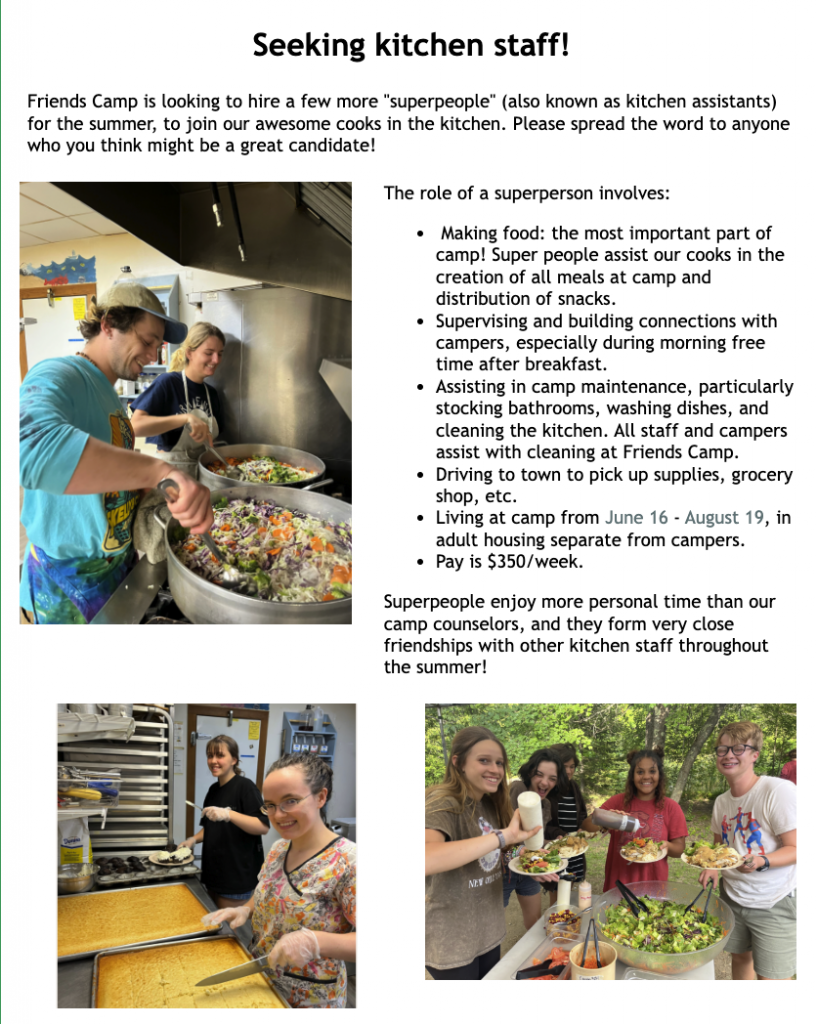
Here is more from Friends Camp from their most recent newsletter:
